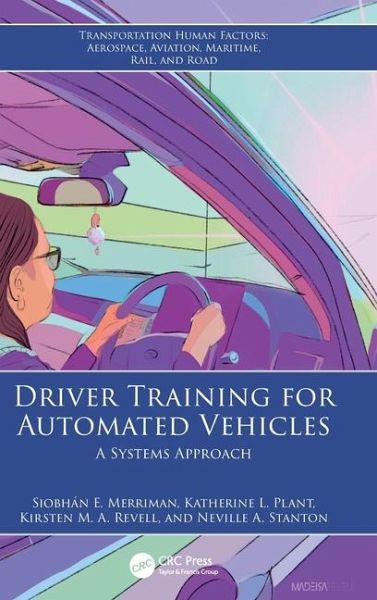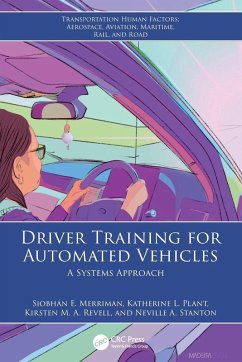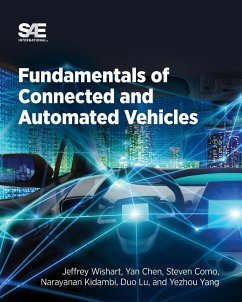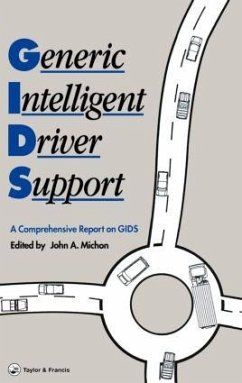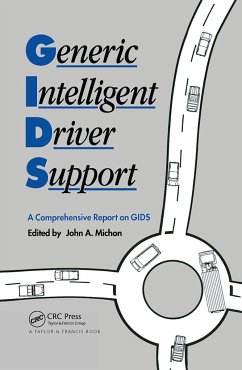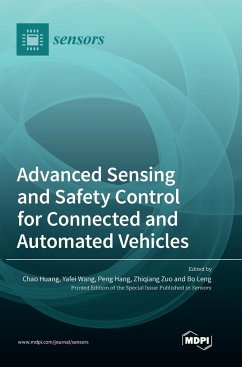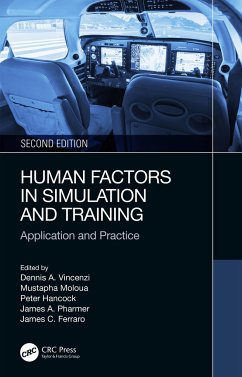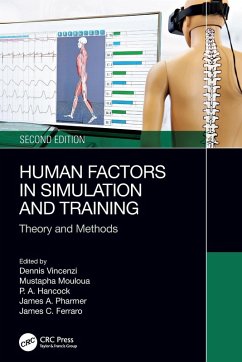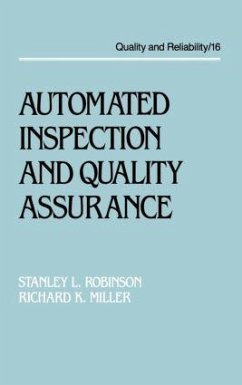Driver Training for Automated Vehicles
A Systems Approach
Versandkostenfrei!
Versandfertig in 1-2 Wochen
Weitere Ausgaben:

PAYBACK Punkte
70 °P sammeln!




Driver Training for Automated Vehicles identifies the training requirements for drivers of AVs and takes a systematic approach to design, develop, implement and evaluate a comprehensive training package to address these requirements.
Dr Siobhán E. Merriman, BSc, MSc, PhD, Grad.CIEHF, MIES, is a Visiting Research Fellow in Human Factors Engineering within the Transportation Research Group, Faculty of Engineering and Physical Sciences at the University of Southampton. Siobhán holds a BSc in Psychology (2018, Royal Holloway University), an MSc in Human Factors and Ergonomics (2019, University of Nottingham) and was awarded a PhD in Engineering and the Environment at the University of Southampton in March 2023. Siobhán's PhD research involved designing, developing and evaluating Training Programmes to improve drivers' mental models, trust, decisions and behaviour when activating Automated Vehicles. In 2022, Siobhan's PhD work contributed to a Government Policy Consultation on Self-Driving Vehicles and was awarded the Dieter W. Jahns Student Practitioner Award by the Foundation for Professional Ergonomics. Since completing her PhD, Siobhán has been investigating how vulnerable road users (e.g. cyclists and pedestrians) will be impacted by the introduction of Automated Vehicles, as part of the REsilient Autonomous SOcio-cyber-physical ageNts project within the UK Research and Innovation Trustworthy Autonomous Systems Programme. Dr Katherine L. Plant, PhD, C.ErgHF, Fellow of HEA, is an Associate Professor in Human Factors Engineering in the Transportation Research Group, Faculty of Engineering and Physical Sciences, University of Southampton. Katherine is the Director of the Human Factors Engineering team, who, in 2018, were the recipients of The Chartered Institute of Ergonomics and Human Factors Presidents Award. Katherine manages an extensive research portfolio covering the fields of trust in autonomous systems, command and control, road safety, and aviation. Katherine's research interests lie in understanding how people make decisions and how we can design the world to support the operational decisions that people need to make safely. Dr Kirsten M. A. Revell, PhD, is a Human Factors Engineering Adjunct Research Fellow in the Faculty of Engineering and Physical Sciences at the University of Southampton in the UK. Kirsten has degrees in Psychology, Industrial Design and Human Factors Engineering. Kirsten's industry background focused on developing technical training programs for Microsoft Ltd. Kirsten's academic work at Brunel University London and the University of Southampton has focused on cognition, usability, and system design. Kirsten specialises in automotive automation and a mental models approach to design and is a passionate advocate for equitable research outputs. Professor Neville A. Stanton, PhD, DSc, is a Chartered Psychologist, Chartered Ergonomist and Chartered Engineer. Neville is Professor Emeritus of Human Factors Engineering in the Faculty of Engineering and Physical Sciences at the University of Southampton in the UK. Neville has degrees in Occupational Psychology, Applied Psychology and Human Factors Engineering and has worked at the Universities of Aston, Brunel, Cornell and MIT. Neville's research interests include modelling, predicting, analysing and evaluating human performance in systems as well as designing the interfaces and interaction between humans and technology. Neville has worked on the design of automobiles, aircraft, ships and control rooms over the past 30 years, on a variety of automation projects. Neville has published 50 books and over 400 journal papers on Ergonomics and Human Factors. In 1998 Neville was presented with the Institution of Electrical Engineers Divisional Premium Award for research into System Safety. The Institute of Ergonomics and Human Factors in the UK awarded Neville The Otto Edholm Medal in 2001, The President's Medal in 2008 and 2018, The Sir Frederic Bartlett Medal in 2012 and The William Floyd Medal in 2019 for his contributions to basic and applied ergonomics research. The Royal Aeronautical Society awarded Neville and his colleagues the Hodgson Prize in 2006 for research on design-induced, flight-deck, error published in The Aeronautical Journal. The University of Southampton has awarded Neville a Doctor of Science in 2014 for his sustained contribution to the development and validation of Human Factors methods.
Produktdetails
- Verlag: CRC Press
- Seitenzahl: 280
- Erscheinungstermin: 30. April 2024
- Englisch
- Abmessung: 240mm x 161mm x 20mm
- Gewicht: 587g
- ISBN-13: 9781032510903
- ISBN-10: 1032510900
- Artikelnr.: 70147480
Herstellerkennzeichnung
Libri GmbH
Europaallee 1
36244 Bad Hersfeld
gpsr@libri.de
Für dieses Produkt wurde noch keine Bewertung abgegeben. Wir würden uns sehr freuen, wenn du die erste Bewertung schreibst!
Eine Bewertung schreiben
Eine Bewertung schreiben
Andere Kunden interessierten sich für




